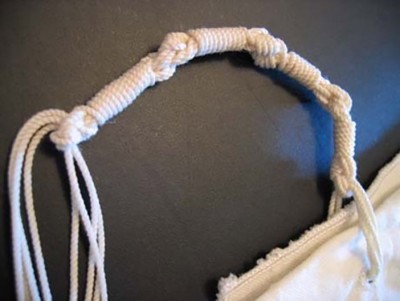
דַּבֵּר אֶל־בְּנֵי יִשְׂרָאֵל וְאָמַרְתָּ אֲלֵהֶם וְעָשׂוּ לָהֶם צִיצִת עַל־כַּנְפֵי בִגְדֵיהֶם...וּרְאִיתֶם אֹתוֹ וּזְכַרְתֶּם אֶת־כָּל־מִצְוֹת ה’ וַעֲשִׂיתֶם ...לְמַעַן תִּזְכְּרוּ וַעֲשִׂיתֶם אֶת־כָּל־מִצְוֹתָי וִהְיִיתֶם קְדֹשִׁים לֵאלֹהֵיכֶם:
“Speak to the Children of Israel and say to them, and they shall make for themselves fringes on the corners of their garments for all generations… And you shall see it and remember all the commandments of G-d and do them…In order that you shall remember and perform all my commandments, and you shall be holy to your G-d.”
The commandment of ציצית (fringes), comes to remind us that we are obligated to do G-d’s commandments, וראיתם אתו וזכרתם את־כל־מצותי that you shall see it and remember all the commandments of G-d. This reminds us that we are the servants of G-d, and what our calling is in this world. In fact, Rashi quoting Midrash Rabba tells us that the Gematria (numerical value) of the word ציצית, is 600. If you then add to it the 8 threads and five knots, this makes a total of 613, which is the number of the commandments that a Jew is commanded to keep.
It says in the Gemara of Menahoth (43b) that Ribbi Meir used to say that blue is specifically mentioned (as opposed to any other color), because it resembles the color of the sea. The sea, in turn, resembles the color of the sky, and the sky resembles the color of a sapphire. The saphire, in turn, resembles the color of the Throne of Glory.
The Keli Yaqar mentions that looking at the blue string of Tekheleth, assists in remembering all of G-d’s commandments, in order to keep them without veering to left or right, even a hair’s breadth. The Gemara mentions that the string of Tekheleth is like the blue of the ocean. The sea remains within the boundaries that G-d has set for it.
It should be noted that while some are of the opinion that we do know what constitutes Tekheleth today, according to Rabbenu the Ari, z”l, we will not know what it is till Mashiah comes.
It says in Yirmiyahu (Jeremiah 5:22)
הַאוֹתִי לֹא־תִירָאוּ נְאֻם־ה’ אִם מִפָּנַי לֹא תָחִילוּ אֲשֶׁר־שַׂמְתִּי חוֹל גְּבוּל לַיָּם חָק־עוֹלָם וְלֹא יַעַבְרֶנְהוּ וַיִּתְגָּעֲשׁוּ וְלֹא יוּכָלוּ וְהָמוּ גַלָּיו וְלֹא יַעַבְרֻנְהוּ:
“Won’t you fear me, said the L-rd, will you not tremble before Me, He Who has placed sand at the borders of the sea, as a perpetual decree, that it may not pass it — even though yhe waves agitated, they were unable to (pass the borders). They roared, but could not pass them.”
From this we see that, even though the sea remains confined within its borders, this does not occur devoid of pain. This represents the aspect of serving G-d out of fear.
The Gemara said further, that the blue of the sea resembles the Heavens. Not only do the Heavens not overstep their boundaries, but, unlike the sea, they are happy to be contained where they are supposed to be. This represents the aspect of serving G-d out of love.
The advantage to the latter, is that the Heavens are likened to the Throne of Glory, which means for us, that through one’s love, one attaches oneself to the Shekhinah. The total number of the 5 knots plus the 8 strings is 13, which is the same number in Gematria as love (אהבה).
It says in the Gemara of Menahoth that the commandment of ציצית, is equal to all the other commandants.
It says in Hod Yosef, that they say that about Hakham Yosef Hayyim, ’a”h, (the holy Ben Ish Hai), that one year, on the Shabbath of Parashat Noah, he spoke about the Halakhoth of ציצית, and said that, according to all opinions, the choicest way of performing the precept was through the use of a garment of sheep’s wool (צמר רחלים), with fringes made of sheep’s wool also.
The next day, knowing the impact that his words would have on all the community, business people bought large quantities of sheep’s wool and within a few days were completely sold out. As a result, they made huge profits.
In Dibrei Mordekhai it mentions that there was one seller, who doubled the price of the ציצית. The people complained to Hakham Yosef Hayyim, ’a”h, who went to the seller and told him that he could only increase the price by 1/6th, and he promptly obeyed.
The kind of diligence that the community showed in wishing to keep this commandment, is the kind of diligence that we should all display. It is, after all, a commandment to ensure that we remember and perform all G-d’s commandments.
Rabbi Ya’aqob Menashe is a renowned author and lecturer, whose Shiurim continue to inspire thousands around the world. Many can be seen at www.NonstopTorah.com. His daily Torah Minutes are eagerly anticipated by thousands every morning. They can be seen at www.ATorahMinute.com. Rabbi Menashe is the spiritual leader of Midrash BEN ISH HAI. More information is available at the Midrash website, www. Midrash.org.
We Are All Obligated
Typography
- Smaller Small Medium Big Bigger
- Default Helvetica Segoe Georgia Times
- Reading Mode












